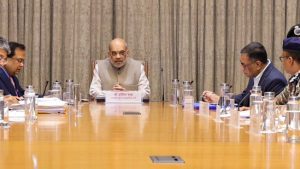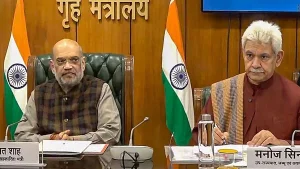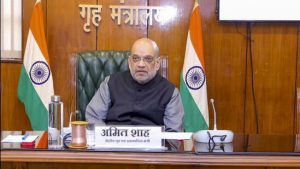Jammu & Kashmir – In a significant move to address security challenges and review developmental progress in the Union Territory, Union Home Minister Amit Shah at J&K security meet on Tuesday emphasized the complete eradication of terrorism from Jammu and Kashmir. The high-level meeting of the Unified Headquarters, held at Raj Bhawan in Srinagar, brought together top security officials and administrative leaders to formulate a comprehensive strategy for ensuring zero infiltration across the border and maintaining regional stability.
High-Profile Security Review at Unified Headquarters

The presence of Amit Shah at J&K security meet marked a pivotal moment for the region’s security apparatus. As the highest security grid in the Union Territory, the Unified Headquarters meeting saw participation from Lieutenant Governor Manoj Sinha, Union Home Secretary Govind Mohan, Intelligence Bureau Director Tapan Deka, and Army Chief General Upendra Dwivedi. The gathering also included GoC Northern Command Lt. General Suchindra Kumar, deputy chief of Army staff, GoC 15 corps, GoC 16 corps, GoC 9 corps, Jammu and Kashmir Chief Secretary, J&K Director General of Police, and chiefs of paramilitary forces including BSF and CRPF, underscoring the significance of the security review.
“The Home Minister is reviewing the security scenario, law and order situation, and other security-related aspects in J&K at the unified headquarters meeting today,” officials confirmed, highlighting the comprehensive nature of the assessment. Sources close to the proceedings revealed that Amit Shah at J&K security meet directed the unified headquarters to act in complete synergy to achieve two critical objectives: zero infiltration from across the border and zero tolerance for terrorist activities in the hinterland.
The Home Minister’s directives reflected the government’s unwavering commitment to establishing lasting peace and security in the region. While expressing satisfaction with the operational efficiency of the security forces, Amit Shah at J&K security meet emphasized the urgent need to eradicate terrorism completely from Jammu and Kashmir, with special attention to the Jammu division, which has witnessed several security incidents in recent months.
Summer Preparedness and Tourist Season Security
Beyond immediate security concerns, Amit Shah at J&K security meet also reviewed preparedness for the upcoming summer months—a period that brings unique challenges and opportunities to the region. With the annual Amarnath Yatra attracting thousands of pilgrims and tourism reaching its peak during this season, comprehensive security arrangements and logistical planning are essential to ensure smooth operations and visitor safety.
The Home Minister’s focus on summer preparedness demonstrates the government’s proactive approach to security management, aiming to prevent any disruptions to the important pilgrimage and tourist influx that contributes significantly to the local economy. By addressing these concerns well in advance during Amit Shah at J&K security meet, authorities hope to create an environment conducive to both spiritual journeys and leisure tourism, thereby supporting economic recovery in the region.
Security experts note that successful management of the Amarnath Yatra and tourist season requires not only heightened vigilance but also coordinated efforts among various security agencies, local administration, and community stakeholders. The directives issued during Amit Shah at J&K security meet are expected to facilitate this multi-layered approach to seasonal security planning.
Development Review with Administrative Leadership
Prior to the security review, Amit Shah at J&K security meet conducted a comprehensive assessment of developmental projects in the Union Territory. This high-level meeting, attended by Lieutenant Governor Manoj Sinha, Chief Minister Omar Abdullah, Chief Secretary Atul Dulloo, additional chief secretaries, and administrative secretaries of various departments, focused on evaluating progress across multiple sectors and identifying areas requiring additional attention or resources.
The development review session reflects the central government’s dual approach to Jammu and Kashmir—enhancing security while simultaneously accelerating development initiatives to improve quality of life and create economic opportunities for residents. By combining security measures with development efforts, the administration aims to address both immediate safety concerns and underlying socioeconomic factors that contribute to regional instability.
Before joining the larger administrative review, the Home Minister held a one-on-one meeting with Chief Minister Omar Abdullah, likely discussing state-specific issues and coordination between central and state authorities. This personal engagement demonstrates the importance of collaborative governance in addressing the multifaceted challenges facing Jammu and Kashmir.
Diplomatic Engagements and Local Outreach
After his arrival in Kashmir on Monday, Amit Shah went to the Humhama area near the Srinagar International Airport to meet the family of martyred J&K Police Dy SP, Humayun Bhat. The home minister offered his condolences to the family. He stayed for nearly 20 minutes with Ghulam Hassan Bhat, retired IGP, father of Humayun. He also offered condolences to Fatima, wife of the martyred police officer and blessed the 20-month old child of the officer.


L-G Manoj Sinha and CM Omar Abdullah accompanied the home minister during his visit to the martyr’s family. Humayun was killed on September 13, 2003, while fighting a group of terrorists in the forests of Kokernag Tehsil in the Anantnag district. Known for his professionalism and bravery, the officer was posthumously awarded the Kirti Chakra.
During his visit to Jammu, Amit Shah met the families of four policemen martyred while fighting terrorists in the Kathua district. He gave compassionate appointment orders to the next of kin of the martyrs.
Throughout his three-day visit that began on Sunday, Amit Shah at J&K security meet balanced high-level administrative discussions with personal outreach to local communities and stakeholders. The Home Minister’s schedule included meetings with various delegations, providing an opportunity for direct communication between central leadership and diverse local interests.
In a significant political development shared on social media platform X, the Home Minister announced that three more organizations have left the separatist Hurriyat Conference and declared their allegiance to the Constitution of India. He described this shift as “growing endorsement of the Prime Minister’s vision about the Naya Kashmir, where violence and hatred would have no place,” suggesting a changing political landscape in the region with increasing acceptance of constitutional governance.
These diplomatic achievements coinciding with Amit Shah at J&K security meet highlight the multi-dimensional strategy being employed by the central government—combining security operations, development initiatives, and political outreach to foster stability and integration in Jammu and Kashmir.
Honoring Sacrifices: Meeting Martyrs’ Families
In a deeply personal gesture that underscored the human cost of the security situation, Amit Shah at J&K security meet took time to visit the families of security personnel who lost their lives in the line of duty. Upon arriving in Srinagar on Monday, the Home Minister traveled to the Humhama area near Srinagar International Airport to meet the family of martyred J&K Police Deputy Superintendent Humayun Bhat.
During this emotional visit, Shah offered condolences to retired IGP Ghulam Hassan Bhat, father of the fallen officer, and spent approximately 20 minutes with the family. He also consoled Fatima, wife of the martyred police officer, and blessed their 20-month-old child. Lieutenant Governor Manoj Sinha and Chief Minister Omar Abdullah accompanied the Home Minister during this solemn occasion, demonstrating unified respect for the ultimate sacrifice made by security personnel.
DSP Humayun Bhat was killed on September 13, 2003, while combating terrorists in the forests of Kokernag Tehsil in Anantnag district. His professional dedication and courage were posthumously recognized with the Kirti Chakra, one of India’s highest peacetime gallantry awards.
The Home Minister’s commitment to honoring fallen security personnel continued during his visit to Jammu, where he met with families of four policemen martyred while fighting terrorists in Kathua district. In a concrete demonstration of support, Amit Shah at J&K security meet presented compassionate appointment orders to the next of kin of these martyrs, providing employment opportunities to help sustain families who lost their primary breadwinners to terrorist violence.
These personal interactions with bereaved families reflect the government’s recognition of the immense sacrifices made by security forces in the pursuit of peace and stability in Jammu and Kashmir. By acknowledging these losses at the highest level, Amit Shah at J&K security meet conveyed a message of solidarity with security personnel and their families, reinforcing the nation’s commitment to supporting those who serve on the frontlines of counter-terrorism operations.
Assessment of Security Situation
During his interactions in Jammu, Amit Shah at J&K security meet provided a candid assessment of the security situation, acknowledging that while terrorism had significantly decreased, it had not been completely eliminated from the Union Territory. However, he expressed confidence that comprehensive security measures and coordinated efforts would soon bring the situation to “complete normalcy,” reflecting guarded optimism about future prospects for peace in the region.
This realistic yet hopeful evaluation suggests a nuanced understanding of security challenges faced by Jammu and Kashmir, avoiding both complacency and undue alarm. By recognizing both progress made and work still required, Amit Shah at J&K security meet set expectations for continued vigilance while providing reassurance about the eventual resolution of security threats.
The Home Minister also engaged in a closed-door meeting with members of the Bharatiya Janata Party (BJP) and Rashtriya Swayamsevak Sangh (RSS) at the Jammu residence of Sunil Sharma, Leader of Opposition in the J&K Assembly. While details of this discussion were not made public, such meetings typically involve sharing security assessments with allied political forces and ensuring alignment on strategic approaches to regional challenges.
Border Security and BSF Recognition
Understanding the critical importance of border security in preventing infiltration, Amit Shah at J&K security meet visited a Border Security Force (BSF) outpost in Kathua on Monday. During this visit, he praised the BSF as an “elite border sentinel force of the country,” acknowledging their crucial role in safeguarding India’s frontiers under challenging conditions.
Addressing deployed BSF personnel, the Home Minister expressed the nation’s high regard for the force, stating, “You discharge duties round the year, 24 hours a day and in torrential rain, extreme cold or 45-degree heat. BSF has a glorious past, and you genuinely deserve the prestige the force has earned among the countrymen.” This recognition from Amit Shah at J&K security meet likely boosted morale among border security personnel who operate in difficult terrain and face constant vigilance requirements.
The emphasis on border security aligns with the broader directive for “zero infiltration” issued during the Unified Headquarters meeting, highlighting the interconnection between frontier management and internal security. By strengthening border surveillance and interception capabilities, security forces aim to prevent the entry of militants and weapons that fuel internal terrorism, creating a comprehensive security envelope around the Union Territory.
Regional Security Dynamics and Strategic Implications
The strategic significance of Amit Shah at J&K security meet extends beyond immediate operational directives, reflecting broader geopolitical considerations affecting the region. Jammu and Kashmir’s sensitive location at the intersection of borders with Pakistan and China requires careful security calibration that addresses both conventional and asymmetric threats.
Security analysts note that the Home Minister’s emphasis on “complete eradication” of terrorism represents an elevation of security objectives beyond containment to elimination—a more ambitious goal requiring sustained intelligence operations, community engagement, and cross-border diplomacy. By setting this higher benchmark during Amit Shah at J&K security meet, the government signals its unwillingness to accept a baseline level of terrorist activity as inevitable in the border region.
The special focus on the Jammu division mentioned during the security review acknowledges shifting patterns in terrorist activities, with increased incidents reported in areas previously considered more secure. This geographic expansion of security concerns necessitates corresponding adjustments in force deployment and intelligence gathering, issues likely addressed in detail during Amit Shah at J&K security meet with operational commanders.
Also Read: Donald Trump Raised Tariffs on China to Shocking 104%
Furthermore, the integration of security and development narratives evident throughout the Home Minister’s visit reflects recognition that sustainable peace requires not only effective counter-terrorism operations but also economic opportunities and governance improvements that address underlying grievances. This dual approach has increasingly characterized central government policy toward Jammu and Kashmir, seeking to complement security operations with developmental initiatives that improve quality of life and create stakeholders in peace.
Public Response and Political Implications
The extensive security review and development assessment conducted during Amit Shah at J&K security meet generated significant public interest across Jammu and Kashmir, with diverse reactions from different political constituencies. Supporters of the central government welcomed the high-level attention to security concerns and development needs, viewing the Home Minister’s direct engagement as evidence of prioritization of the region’s stability and progress.
Political observers note that the timing of Amit Shah at J&K security meet—following recent assembly elections and government formation in the Union Territory—suggests an effort to establish productive working relationships with the new administration while maintaining security oversight. The one-on-one meeting between the Home Minister and Chief Minister Omar Abdullah potentially laid groundwork for center-state coordination on security matters, a crucial factor in effective counter-terrorism operations.
The announcement regarding former separatist organizations pledging allegiance to the Indian Constitution represents a significant political development coinciding with Amit Shah at J&K security meet. This shift may indicate changing political dynamics in the region, with decreasing support for separatist ideologies and increasing acceptance of constitutional governance frameworks. If sustained, such transitions could fundamentally alter the political landscape of Jammu and Kashmir over time.
Looking Forward: Security Roadmap and Developmental Vision


As Amit Shah at J&K security meet concluded his three-day visit to the Union Territory, the directives issued and relationships established are expected to shape security operations and developmental initiatives in the coming months. The comprehensive review of both security and administrative matters provides a foundation for coordinated action across multiple government agencies and security forces.
The emphasis on summer preparedness suggests intensified security arrangements for the Amarnath Yatra and tourist season, likely involving increased deployment of security personnel, enhanced surveillance technologies, and coordinated intelligence sharing among various agencies. These measures aim to prevent any disruptions to religious pilgrimages or tourism activities that could impact both public safety and economic recovery in the region.
On the developmental front, the review conducted during Amit Shah at J&K security meet will likely accelerate implementation of ongoing projects while identifying new priority areas for investment and administrative attention. This balanced approach—addressing security concerns while advancing development goals—reflects the government’s recognition that sustainable peace requires both effective counter-terrorism operations and improved socioeconomic conditions.
Final Word: A Comprehensive Approach to Regional Stability
The extensive engagement of Amit Shah at J&K security meet with security, administrative, and community stakeholders during his three-day visit demonstrates the central government’s multifaceted approach to addressing challenges in Jammu and Kashmir. By combining high-level security reviews with development assessments, honoring fallen security personnel, and engaging with political constituents, the Home Minister’s visit encompassed military, administrative, and human dimensions of regional governance.
The directives for zero infiltration and zero tolerance for terrorism issued during Amit Shah at J&K security meet establish clear security objectives, while development reviews and project assessments ensure that peace-building efforts extend beyond security operations to address quality of life and economic opportunity. This comprehensive strategy recognizes that sustainable stability requires addressing both immediate security threats and underlying socioeconomic factors that influence regional dynamics.
As security forces implement operational directives and administrative authorities advance development initiatives following Amit Shah at J&K security meet, the effectiveness of this integrated approach will be measured not only by statistical improvements in security metrics but also by tangible progress in economic development, governance effectiveness, and public confidence. The ultimate success of policies outlined during this high-level visit will depend on consistent implementation, cross-agency coordination, and adaptive responses to evolving regional conditions.

